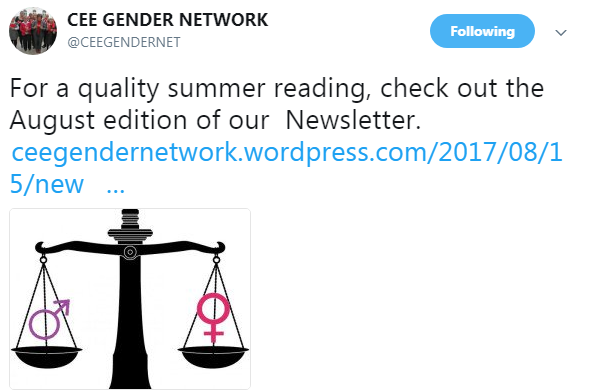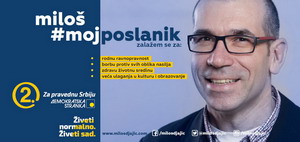Prva premijerka Srbije
Drugarice iz CEE Gender networka su me zamolile da napišem tekst za njihov augustovski newsletter.
U Srbiji je posle gotovo tri decenije od uvođenja višestranačja za Predsednicu Vlade je izabrana žena, Ana Brnabić. Poslednji put zemlju u kojoj sam živeo vodila je žena, Milka Planinc, od 1982 do 1986. godine kao Predsednica Saveznog izvršnog veća SFRJ. Ona je u istoriji ostala zabeležena kao jedina premijerka jedne socijalističke države.
Uvek sam se pitao zašto u periodima kada neku zemlju vodi desnica, žene mogu da dođu na istaknute funkcije, a kada je vodi levica to ispada nemoguće? Zašto se levičarske stranke koje su uvek svetu donosile progres i promene, naročito u oblastima ljudskih prava, solidarnosti i ravnopravnosti, teško odlučuju da povere odgovorne funkcije ženama? Nama levičarima to ostaje kao važna bitka koju moramo da dobijemo da bismo istinski ravnopravno otvorili politički prostor svima.
Verujem da su kvote važne i da je tih minimalnih 30% neophodno za promenu. Na žalost ovoga puta smo dobili predsednicu Vlade ali smo izgubili jednu ministarku i broj žena u Vladi, je sa 25 odsto pao na 22 odsto. Bez obzira na sve to izbor Ane Brnabić predstavlja korak napred i veliko ohrabrenje za sve nas koji očekujemo da će žena na ovako važnoj fukciji biti senzibilisanija za pitanja rodne ravnopravnosti, ljudskih i manjinskih prava, politika jednakih mogućnosti i borbu protiv nasilja. Ovo je velika prilika da Vlada konačno predloži novi Zakon o rodnoj ravnopravnosti, koji već godinama čekamo i bez koga je napredak u ovoj oblasti nemoguć.
Međutim, ekspoze nove Predsednice nije bio rodno senzitivan. Rodna ravnopravnost je pomenuta samo jednom i to kod pohvale da je Srbija uvela “Indeks rodne ravnopravnosti” po ugledu na članice EU. U samom ekspozeu je bilo mnogo prilika da se istakne podrška ženama u mnogim sektorima i oblastima koje je navela. Njena najava “kao Predsednica Vlade ohrabrivaću dijalog”, verujem će unaprediti mere koje su ekspozeu navedene. Ukoliko zaista bude otvorena za dijalog sa civilnim društvom i otvorena za njegove predloge, to će već biti dovoljno makar za minimalne pomake napred.
Da situacija u Srbiji u ovoj oblasti nije sjajna pokazala je i javna debata “Vojvodina liderka rodne ravnopravnosti?” je održana u Novom Sadu. Podsetiću da je Skupština Autonomne Pokrajnine Vojvodine bila prva institucija koja je nakon promena 2000. – te uvela tela i donela odluke u vezi sa rodnom ravnopravnošću i uvek je gledana kao liderka u ovoj oblasti sa mnogobrojnim programima i otvorenim dijalogom. Na tom skupu su ekspertkinje analizirale prvih godinu dana rada nove Vlade Vojvodine. Podaci do kojih su došle pokazuju da je primetno smanjenje aktivnosti, diskontinuitet u radu pokrajinskih mehanizama za rodnu ravnopravnost i da je saradnja sa ženskim organizacijama slabija nego ikad. Ovi izneseni podaci su važni jer govore o tome da Ana Brnabić nasleđuje sistem za unapređenje rodne ravnopravnosti koji značajno manje funkcionalan nego što je to nekada bio. Samim tim, njen posao u ovoj oblasti će biti teži.
Predsednica Vlade je jednom prilikom izjavila “Ustav nas obavezuje da štitimo prava svih naših gradjana i da se ta zaštita mora videti u svemu što radimo i govorimo.” Ova izjava i njeno lično životno iskustvo, koje je sigurno u velikoj meri bilo obeleženo njenim ličnim svojstvima, može biti taj prvi impuls za početak građenja politika ravnopravnosti. Zato verujemo da će, što se tiče rodne ravnopravnosti , dijalog sa Predsednicom Vlade biti otvoren i da ćemo uskoro moći da kažemo da Vlada Srbije menja svest i uvodi neophodne promene koje će doprineti da rodna ravnopravnost postane važno razvojno pitanje.
English (informal) translation
Almost three decades after the introduction of the multi-party system in Serbia, a woman, Ana Brnabić, was elected Prime Minister. Milka Planinc who was President of the Federal Executive Council of the SFRY (1982-1986) was the last time a woman was elected to this position in the country in which lived. Planinc has remained in history as the only prime minister of a socialist state.
I have always wondered why is it that in periods when a country is led by the right, women can come to prominent functions, but when the left is in power it turns out to be impossible ?! Why do left-wing parties that have always brought about progress and change, especially in the areas of human rights, solidarity and equality, have difficulty in delegating responsible functions to women? We on the left have to wage and win this important battle in order to truly and equally open the political space for everyone.
I believe that the quotas are important and that a minimum of 30% quota for women is necessary for the change. Unfortunately, this time we did get a Prime Minister woman, but we lost one woman minister and the number of women in the government fell from 25% to 22%. Regardless of this, Ana Brnabić represents a step forward and a great encouragement for all of us who expect that the woman in such an important function will be partial to issues of gender equality, human and minority rights, equal opportunity policies and the fight against violence. This is a great opportunity for the Government to finally submit a new Law on Gender Equality, which we have been waiting for years and without which progress in this area is impossible.
However, the speeches of the new Prime Minister were not gender sensitive. Gender equality is mentioned only once praising Serbia for introducing the “Gender Equality Index” based on action taken by EU members. In this speech, however, there were many opportunities to highlight the support and participation of women in many sectors and areas it cited. Her statement that “as Prime Minister I shall encourage dialogue”, I believe will improve the measures outlined above. If her cabinet will be really open to dialogue with civil society and open to its proposals, it will already be enough at least for the minimum step forward.
That the situation in Serbia in this area is not great was also shown by the public debate “Vojvodina leader of gender equality?” which was held in Novi Sad. I would like to remind that the Assembly of the Autonomous Province of Vojvodina was the first institution that, after the change in 2000, introduced the relevant assembly bodies and made decisions regarding gender equality and was always seen as a leader in this area with numerous programmes and open dialogue. Experts analysed the first year of work of the new Government of Vojvodina at that meeting. The data they have come to indicate that there is a noticeable decrease in activity, a discontinuity in the work of provincial gender equality mechanisms, and that cooperation with women’s organisations is weaker than ever. This data are important because they indicate that Ana Brnabić inherits a system for the promotion of gender equality that is significantly less functional than it used to be. Therefore, her job in this area will be tougher.
The Prime Minister once stated: “The Constitution obliges us to protect the rights of all our citizens and that this protection must be seen in everything we do and speak.” This statement and her personal life experience, which has certainly been largely marked by her personal qualities, can be the first impulse to start building equality policies. Therefore, we believe that with regard to gender equality, the dialogue with the President of the Government (Prime Minister) will be opened and that we will soon be able to say that the Government of Serbia changes its mind and introduces the necessary changes that will contribute to gender equality becoming an important development issue







